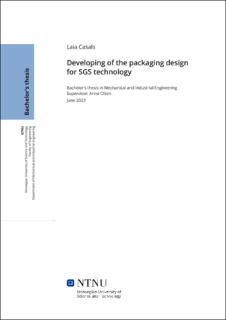| dc.description.abstract | This thesis addresses the significant problem of food waste, with a specific focus on the food industry, which is one of the major contributors to this issue. By extending the shelf-life of food products, it is possible to reduce food losses throughout the production and supply chains. Consequently, this study aims to develop a packaging solution that can effectively preserve a certain quantity of SGS-treated food, particularly salmon, for an extended period while maintaining its quality.
To achieve the goal of developing an optimal packaging for SGS-treated salmon, a comprehensive concept development study was conducted. Additionally, a packaging model was created and subjected to strength analysis using SolidWorks software. Through these efforts, it was determined that the most suitable packaging material is polyethylene (PE), based not only on specific functional criteria, but also, a strength analysis considering factors such as its ability to withstand the pressure exerted by CO2 within the packaging, ensuring the desired level of deflection.
By developing an innovative packaging design for SGS-treated salmon, this thesis contributes to the larger objective of reducing food waste in the food industry. The findings of this study provide valuable insights for industry professionals and researchers interested in enhancing the shelf-life of perishable food products through effective packaging solutions. | |
